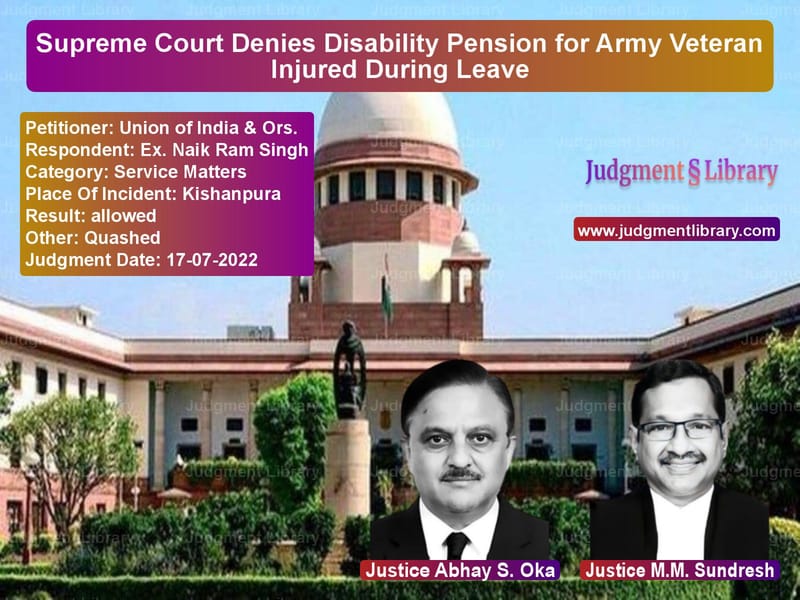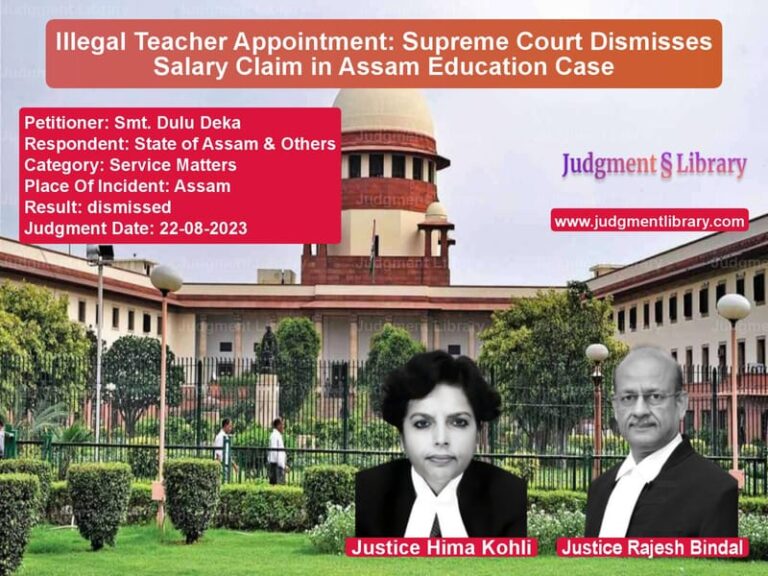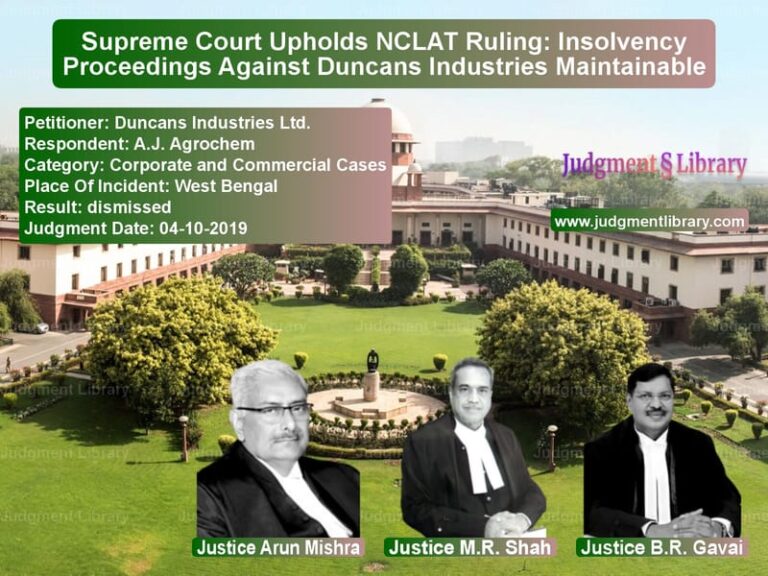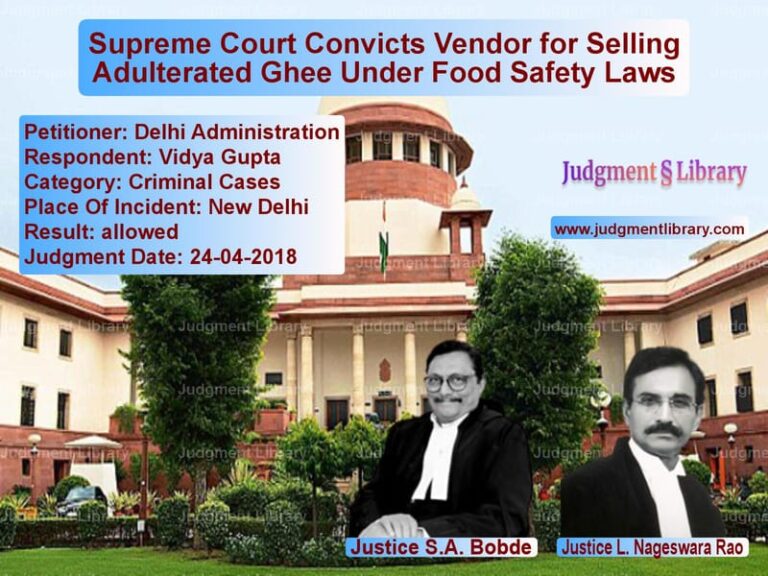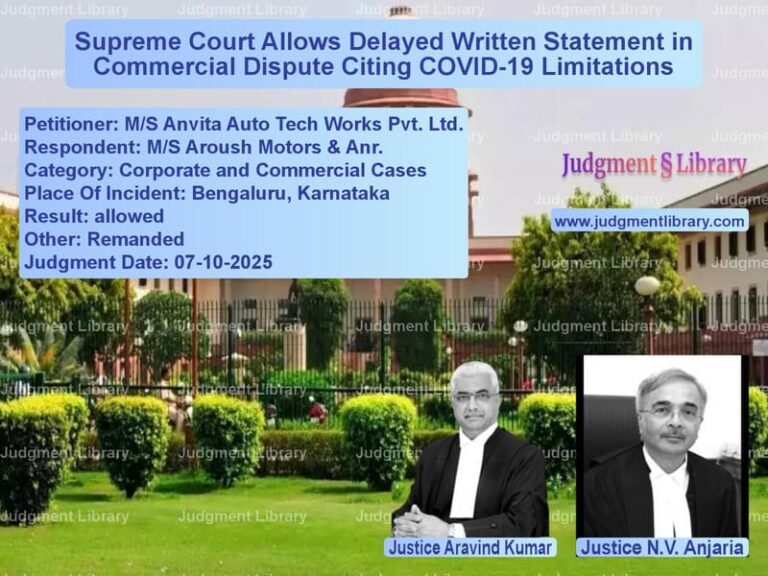Supreme Court Denies Disability Pension for Army Veteran Injured During Leave
In a significant ruling, the Supreme Court of India has clarified the conditions under which a member of the Armed Forces can claim disability pension. The case, Union of India & Ors. vs. Ex. Naik Ram Singh, revolved around whether an army veteran who suffered injuries in a road accident while on leave was entitled to disability pension.
Background of the Case
The respondent, Ex. Naik Ram Singh, was enrolled in the Indian Army on June 4, 1965. After serving for 10 years and 88 days, he was transferred to the reserve establishment on August 30, 1975. During his reserve period, he voluntarily enrolled in the Defence Security Corps on January 7, 1976.
While on annual leave on November 8, 1999, the respondent was involved in a road accident in Kishanpura, where he was hit by a speeding scooter while crossing the road. As a result of the accident, he suffered severe head injuries and was subsequently assessed by a medical board, which determined his disability at 80%. Due to his medical condition, he was invalidated out of service on September 28, 2000.
The respondent then applied for disability pension, which was rejected by the authorities. He subsequently approached the Armed Forces Tribunal (AFT), Chandigarh Bench, which ruled in his favor, directing the Union of India to grant him disability pension with arrears for three years preceding his application.
Arguments by the Petitioner (Union of India)
The Union of India challenged the AFT’s decision before the Supreme Court, arguing:
- That there must be a reasonable connection between the injury and military service to qualify for a disability pension.
- The accident occurred after the respondent had reached his leave station, meaning he was no longer on duty.
- Regulation 173 of the Pension Regulations for the Army, 1961, stipulates that disability pension is only granted if the injury is attributable to or aggravated by military service.
- Rule 12 of the Entitlement Rules for Casualty Pensionary Awards, 1982, states that an individual traveling between their place of duty and leave station is considered on duty. However, the respondent had already reached his leave station before the accident.
- The case of Union of India vs. Vijay Kumar (2015) (10 SCC 460) establishes that a “reasonable causal connection” between the injury and military service is essential.
Arguments by the Respondent (Ex. Naik Ram Singh)
The respondent contended that:
- The accident occurred while he was on authorized leave, which should be considered an extension of military duty.
- The Armed Forces Tribunal had correctly held that if an individual sustains an injury during authorized leave and his act is not inconsistent with military service, the injury should be deemed attributable to military service.
- Past judgments have supported the liberal interpretation of entitlement rules in favor of ex-servicemen.
Supreme Court’s Observations
A bench comprising Justices Abhay S. Oka and M.M. Sundresh carefully examined the relevant pension regulations and past precedents. The Court made the following key observations:
- Regulation 173 of the Pension Regulations states that unless otherwise specified, a disability pension may be granted to an individual who is invalidated from service due to a disability attributable to or aggravated by military service and is assessed at 20% or more.
- Clause (d) of Note 2 of Rule 12 of the Entitlement Rules, 1982, states that personnel traveling between their place of duty and leave station are considered on duty. However, in this case, the accident occurred after the respondent had reached his leave station, meaning he was no longer covered under this provision.
- Referring to Union of India vs. Vijay Kumar, the Court reiterated that there must be a “reasonable causal connection” between the injury and military service.
- The fact that the accident occurred while the respondent was on leave did not establish a link between the injury and military service.
Final Judgment
After a detailed examination of the facts and legal provisions, the Supreme Court ruled:
“There is absolutely no nexus between the military service and the injuries sustained by the respondent. There is not even a causal connection. The Tribunal has completely overlooked this aspect which goes to the root of the matter. Hence, the respondent was not entitled to the disability pension.”
The Court allowed the appeal, setting aside the AFT’s decision and dismissing the respondent’s claim for disability pension.
Key Takeaways from the Judgment
- Strict Interpretation of Disability Pension Rules: The Supreme Court reaffirmed that disability pension can only be granted if an injury is directly attributable to or aggravated by military service.
- Clarification on ‘On Duty’ Definition: Personnel traveling to or from their duty station are considered on duty, but once they reach their leave station, they are not.
- Importance of Causal Connection: Merely being on authorized leave is not sufficient to establish entitlement to disability pension.
- Judicial Review of AFT Decisions: The judgment underscores that Armed Forces Tribunal decisions must align with existing legal principles and precedents.
Impact of the Judgment
This ruling has far-reaching implications for how disability pension claims by ex-servicemen are evaluated. The decision ensures that only those injuries which have a clear and direct link to military service qualify for benefits. It also establishes guidelines on when a soldier is considered to be on duty for the purpose of pension entitlements.
Conclusion
The Supreme Court’s ruling in Union of India & Ors. vs. Ex. Naik Ram Singh clarifies a crucial aspect of military pension law, reinforcing the principle that only injuries attributable to or aggravated by military service can qualify for disability pension. This decision sets a precedent for future cases involving similar claims, ensuring that the grant of benefits is based on well-defined legal criteria.
Petitioner Name: Union of India & Ors..Respondent Name: Ex. Naik Ram Singh.Judgment By: Justice Abhay S. Oka, Justice M.M. Sundresh.Place Of Incident: Kishanpura.Judgment Date: 17-07-2022.
Don’t miss out on the full details! Download the complete judgment in PDF format below and gain valuable insights instantly!
Download Judgment: union-of-india-&-ors-vs-ex.-naik-ram-singh-supreme-court-of-india-judgment-dated-17-07-2022.pdf
Directly Download Judgment: Directly download this Judgment
See all petitions in Pension and Gratuity
See all petitions in Public Sector Employees
See all petitions in Employment Disputes
See all petitions in Disciplinary Proceedings
See all petitions in Other Cases
See all petitions in Judgment by Abhay S. Oka
See all petitions in Judgment by M.M. Sundresh
See all petitions in allowed
See all petitions in Quashed
See all petitions in supreme court of India judgments July 2022
See all petitions in 2022 judgments
See all posts in Service Matters Category
See all allowed petitions in Service Matters Category
See all Dismissed petitions in Service Matters Category
See all partially allowed petitions in Service Matters Category

